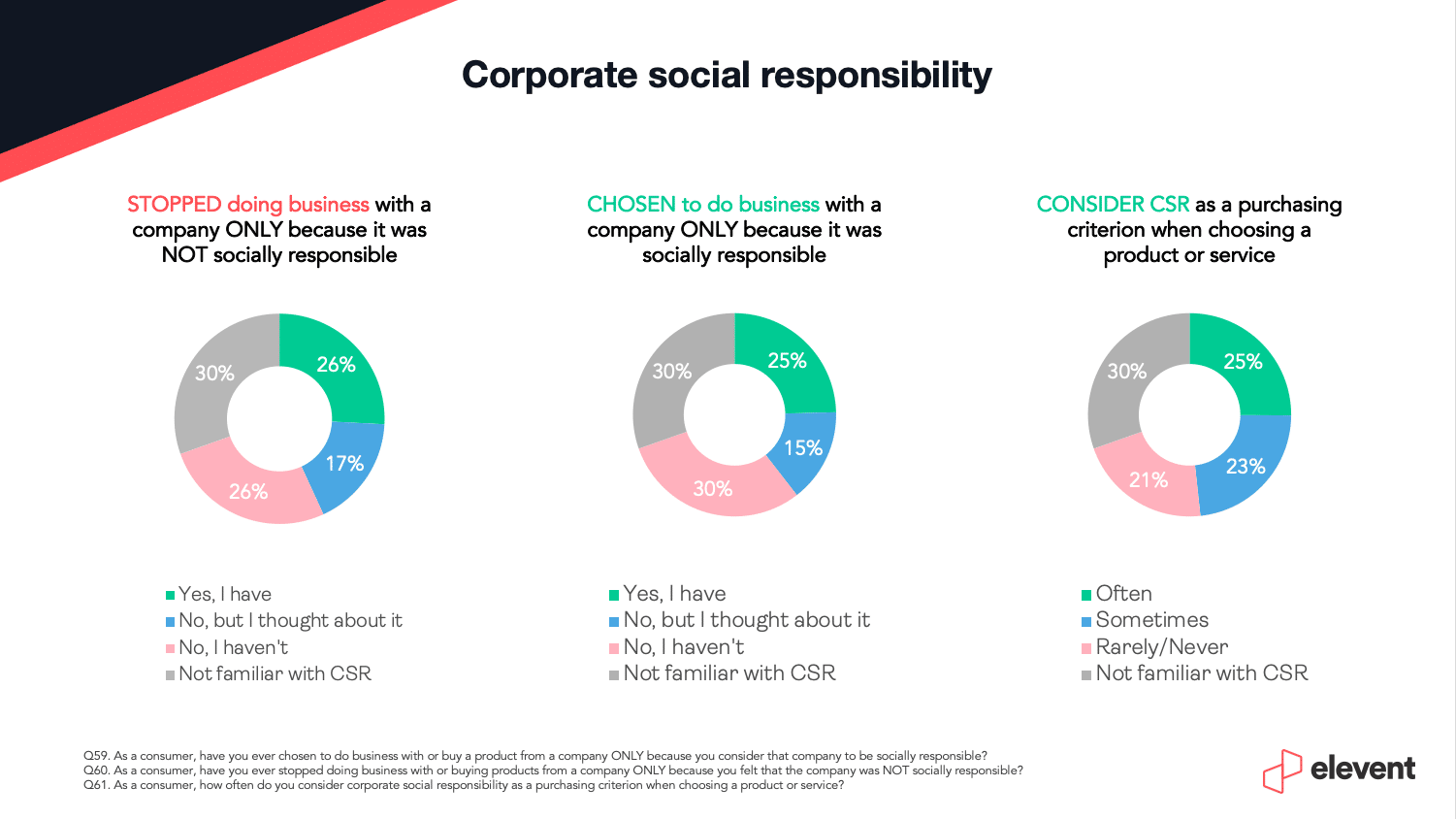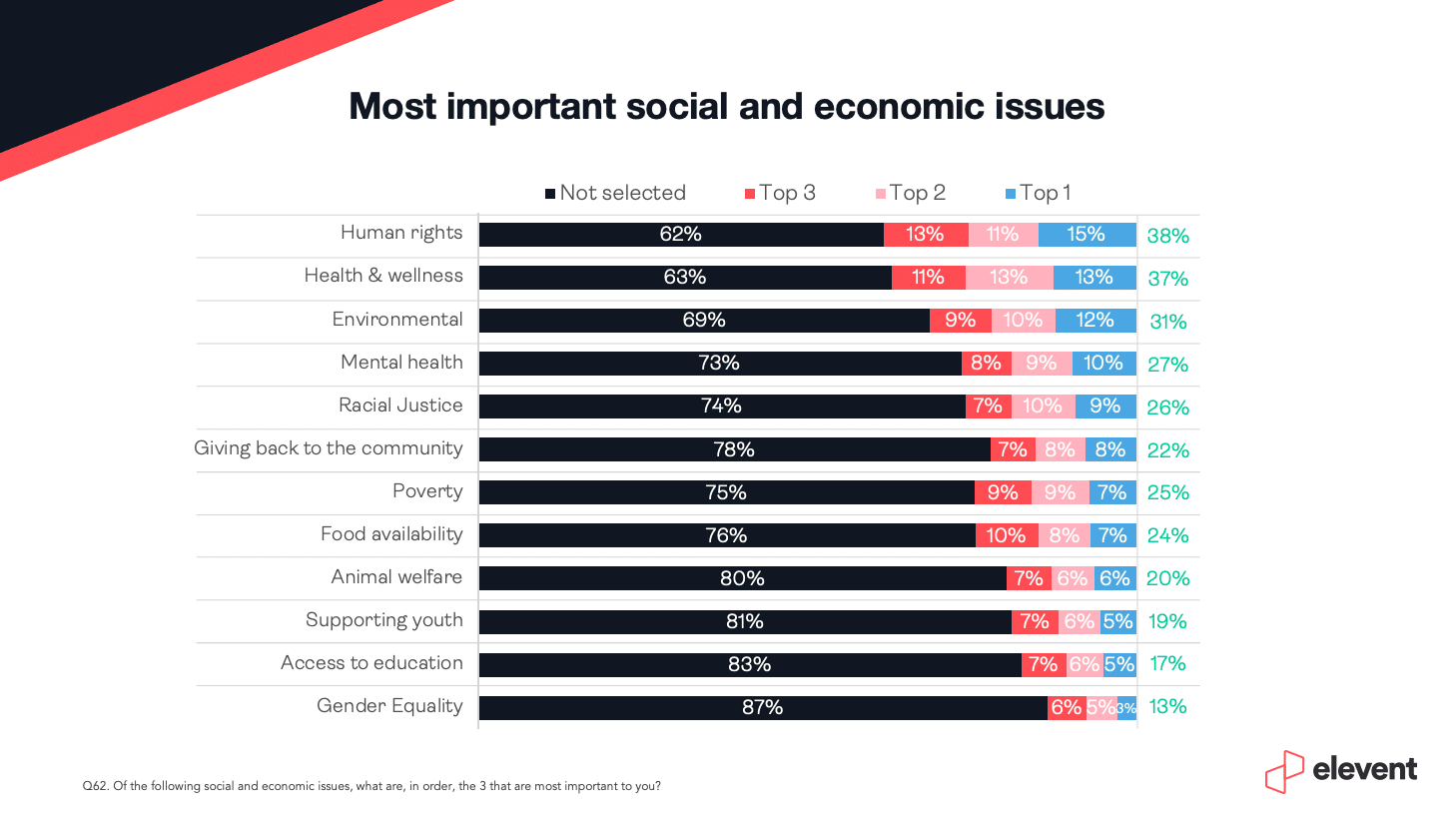Impact of corporate social responsibility on purchase intent

Partnerships that support causes are increasingly used as a way to improve corporate image.
Corporate social responsibility (CSR) is a form of self-regulation that reflects a business’s commitment to contributing to the betterment of society, in addition to generating profits. Companies that embrace CSR aim to maximize profits while also considering the impact of their actions on the environment, their employees, customers, and the wider community.
Why CSR Matters
A recent Elevent survey conducted in the U.S. market revealed the impact of CSR on purchase intent. The study looked not only at purchase intentions but also at action, which is a far stronger benchmark.
Of those surveyed, 26% said that they had stopped doing business with a company because they did not feel it contributed positively to society. Conversely, a quarter of respondents declared that the perceived CSR of a corporation was the main reason they did business with that company. Another quarter said that it was often a purchasing criterion.

However, as purchase intention varies according to product category, this study does have some limitations. Price is certainly a key element that may outweigh social preoccupations. Still, 25% of purchases can be directly attributed to this phenomenon.
The data points to multiple managerial implications. CSR is not something corporations can address overnight; the changes required take time to evolve as they involve corporate culture, processes, sourcing, manufacturing, and, most of all, consumer perception.
A shift from philanthropy to cause partnerships
In recent years, corporate dollars earmarked for traditional philanthropy have increasingly shifted to cause-based partnerships.
One reason for this is that cause partnerships allow companies to align their corporate social responsibility goals with their business objectives, creating a win-win scenario for both parties. By partnering with non-profit organizations, businesses can leverage their resources and expertise to create social and environmental impact, enhancing their brand reputation, customer loyalty, and employee engagement in the process.
The pressure to address CSR issues and generate goodwill has led many businesses to increasingly integrate partnerships with causes or foundations and publicize their corporate citizenship efforts through these associations to reap benefits.
The advantage of partnerships is that they represent a quicker route to demonstrating positive impact and influencing consumer perceptions.
The data appears to support this. According to the 2021 Giving in Numbers report published by the Chief Executives for Corporate Purpose (CECP), total giving from companies that were in partnerships with non-profit organizations increased from 31% to 38% between 2015 and 2019. Partnerships with nonprofits increased by 64% in the same period.
Being relevant
To make an impact, companies need to find both a cause that is relevant to their business and an issue that will resonate with the public.
Top U.S. social and economic issues
As part of Elevent’s Perspectives Study, consumers were asked to rank 12 of the most pressing social and economic issues in order of importance. The most cited were human rights, health and wellness, and the environment. The least important issues as identified by the survey included gender equality, access to education, and supporting youth.

Needless to say, these findings may vary depending on events and media coverage accorded any specific issue. Protection of the environment, for instance, tends to take a back seat in times of economic uncertainty. The last-place ranking for gender equality, on the other hand, may be a result of the (perceived or real) progress on this issue in the last decades.
Implementing a partnership-based strategy
Setting up a partnership policy and strategy that will support a CSR initiative is much like implementing a sponsorship strategy and policy. Most of our work with clients over the last 10 years has involved both sponsorships AND donations. The same core principles apply: be relevant, find a white space that is unique to the brand, have a plan to invest over time, then have a strategy to promote the partnership to your various targets.
It is not all about consumer perception. Companies must put it in the actual work. A number of brands, including Pepsi and Audi, were accused of “woke-washing,” for launching ads touching on social issues while lacking the legitimacy to take a position.
Undertaking CSR initiatives is no longer a frill. Elevent’s co-founder, Jay Hebert, compares CSR to WIFI: It’s foundational, you need to have it. It’s ubiquitous, but necessary. Consumers demand it from companies, both large and small. There are myriad reasons for acting, with existential and commercial incentives providing the primary drivers.
Sources:
Elevent’s Perspectives Study, U.S. market, 2022
2021 Giving in Numbers, Chief Executives for Corporate Purpose (CECP), https://cecp.co/.
